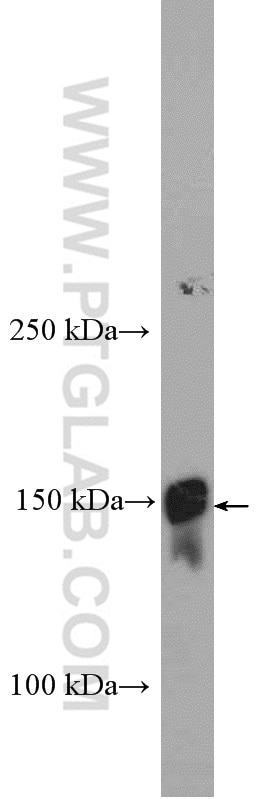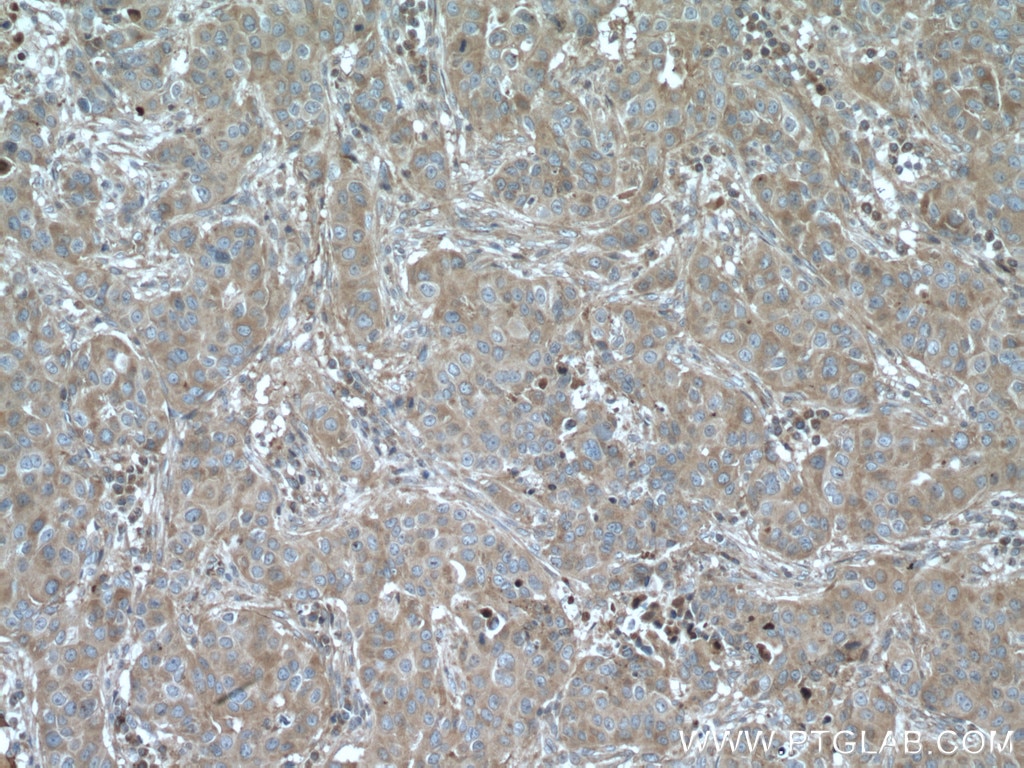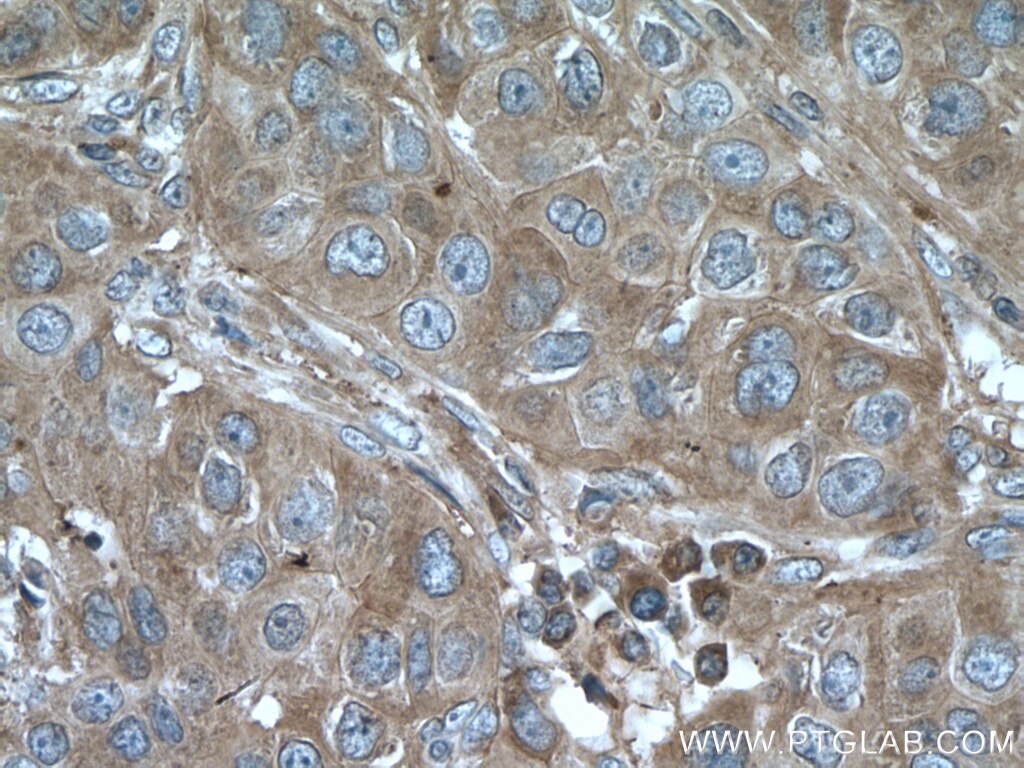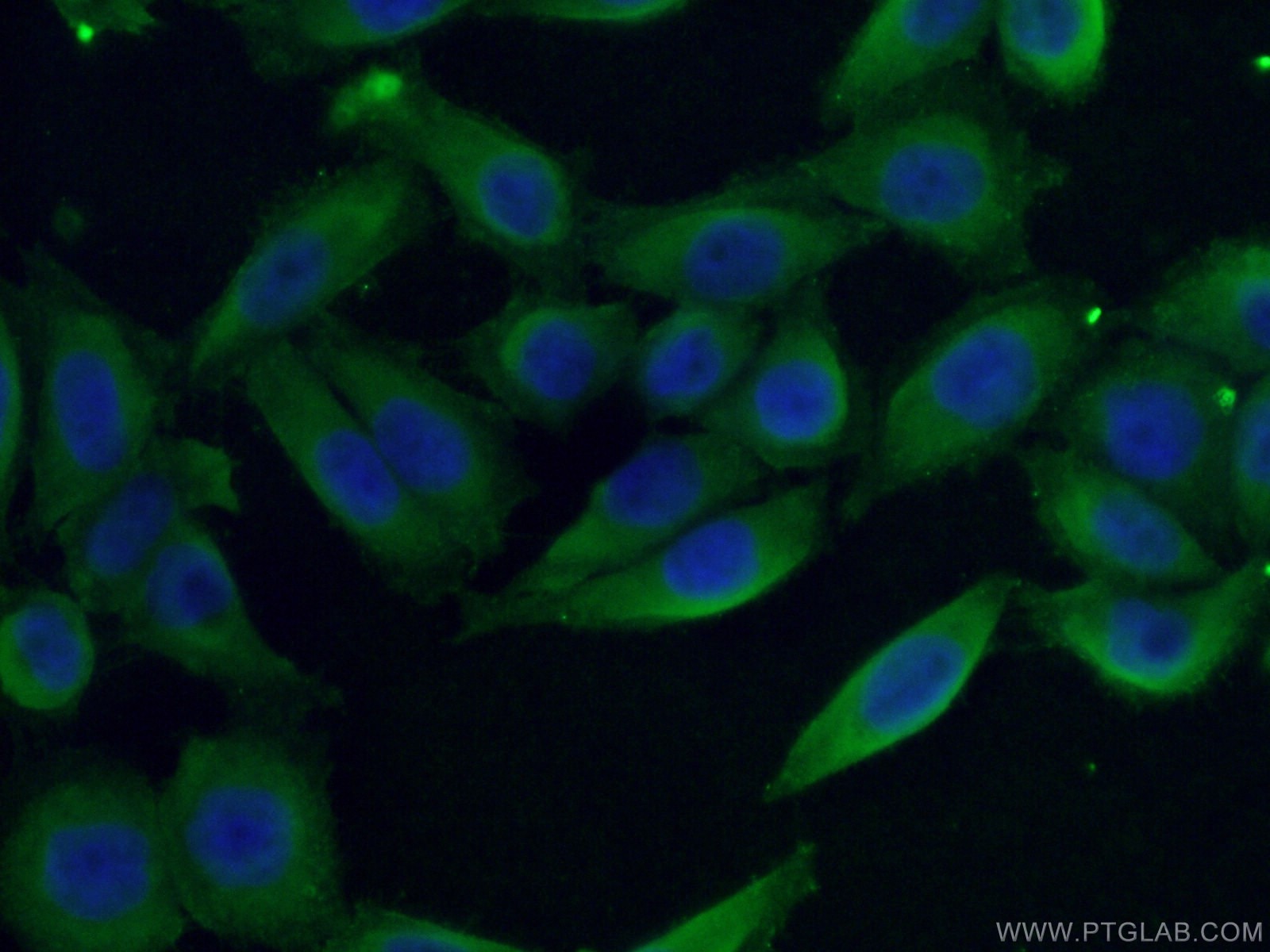- Featured Product
- KD/KO Validated
LTBP1 Polyklonaler Antikörper
LTBP1 Polyklonal Antikörper für WB, IHC, IF/ICC, ELISA
Wirt / Isotyp
Kaninchen / IgG
Getestete Reaktivität
human und mehr (1)
Anwendung
WB, IHC, IF/ICC, ELISA
Konjugation
Unkonjugiert
Kat-Nr. : 26855-1-AP
Synonyme
Geprüfte Anwendungen
| Erfolgreiche Detektion in WB | humanes Plasmagewebe |
| Erfolgreiche Detektion in IHC | humanes Mammakarzinomgewebe Hinweis: Antigendemaskierung mit TE-Puffer pH 9,0 empfohlen. (*) Wahlweise kann die Antigendemaskierung auch mit Citratpuffer pH 6,0 erfolgen. |
| Erfolgreiche Detektion in IF/ICC | HeLa-Zellen |
Empfohlene Verdünnung
| Anwendung | Verdünnung |
|---|---|
| Western Blot (WB) | WB : 1:500-1:3000 |
| Immunhistochemie (IHC) | IHC : 1:50-1:500 |
| Immunfluoreszenz (IF)/ICC | IF/ICC : 1:50-1:500 |
| It is recommended that this reagent should be titrated in each testing system to obtain optimal results. | |
| Sample-dependent, check data in validation data gallery | |
Veröffentlichte Anwendungen
| KD/KO | See 1 publications below |
| WB | See 7 publications below |
| IHC | See 3 publications below |
| IF | See 3 publications below |
Produktinformation
26855-1-AP bindet in WB, IHC, IF/ICC, ELISA LTBP1 und zeigt Reaktivität mit human
| Getestete Reaktivität | human |
| In Publikationen genannte Reaktivität | human, Maus |
| Wirt / Isotyp | Kaninchen / IgG |
| Klonalität | Polyklonal |
| Typ | Antikörper |
| Immunogen | LTBP1 fusion protein Ag25392 |
| Vollständiger Name | latent transforming growth factor beta binding protein 1 |
| Berechnetes Molekulargewicht | 1721 aa, 187 kDa |
| Beobachtetes Molekulargewicht | 150 kDa |
| GenBank-Zugangsnummer | BC130289 |
| Gene symbol | LTBP1 |
| Gene ID (NCBI) | 4052 |
| Konjugation | Unkonjugiert |
| Form | Liquid |
| Reinigungsmethode | Antigen-Affinitätsreinigung |
| Lagerungspuffer | PBS with 0.02% sodium azide and 50% glycerol |
| Lagerungsbedingungen | Bei -20°C lagern. Nach dem Versand ein Jahr lang stabil Aliquotieren ist bei -20oC Lagerung nicht notwendig. 20ul Größen enthalten 0,1% BSA. |
Hintergrundinformationen
Latent Transforming Growth Factor Beta Binding Protein 1 (LTBP1) is a large extracellular matrix protein that belongs to the latent TGF-beta binding protein family. It plays a crucial role in the regulation of TGF-beta, a multifunctional cytokine involved in various cellular processes such as cell growth, differentiation, and immune response. LTBP1 is essential for TGF-beta folding, secretion, matrix localization, and activation. It forms latent complexes with TGF-beta by covalently binding the TGF-beta propeptide (LAP) via disulfide bonds in the endoplasmic reticulum. This complex is then secreted and targeted to the extracellular matrix, where TGF-beta can be activated by various mechanism.
Protokolle
| PRODUKTSPEZIFISCHE PROTOKOLLE | |
|---|---|
| WB protocol for LTBP1 antibody 26855-1-AP | Protokoll herunterladen |
| IHC protocol for LTBP1 antibody 26855-1-AP | Protokoll herunterladenl |
| IF protocol for LTBP1 antibody 26855-1-AP | Protokoll herunterladen |
| STANDARD-PROTOKOLLE | |
|---|---|
| Klicken Sie hier, um unsere Standardprotokolle anzuzeigen |
Publikationen
| Species | Application | Title |
|---|---|---|
Cell Rep Integrative single-cell meta-analysis reveals disease-relevant vascular cell states and markers in human atherosclerosis | ||
Phytomedicine Rg3 inhibits hypoxia-induced tumor exosomes from boosting pancreatic cancer vasculogenic mimicry through the HIF-1α/LARS1/mTOR axis | ||
J Transl Med LTBP1 promotes esophageal squamous cell carcinoma progression through epithelial-mesenchymal transition and cancer-associated fibroblasts transformation.
| ||
Cell Death Discov ERRFI1 induces apoptosis of hepatocellular carcinoma cells in response to tryptophan deficiency. | ||
Arterioscler Thromb Vasc Biol Secreted Protein Profiling of Human Aortic Smooth Muscle Cells Identifies Vascular Disease Associations |
Rezensionen
The reviews below have been submitted by verified Proteintech customers who received an incentive for providing their feedback.
FH Udesh (Verified Customer) (10-05-2022) | The Ab was used at 1:1000 dilution in NFDM overnight 4 degrees and detected a band close to 220 kD in 20ug cell lysate. Also tested for for positive IF staining at 1:250 dilution in 2% BSA overnight at 4 degrees.
 |





